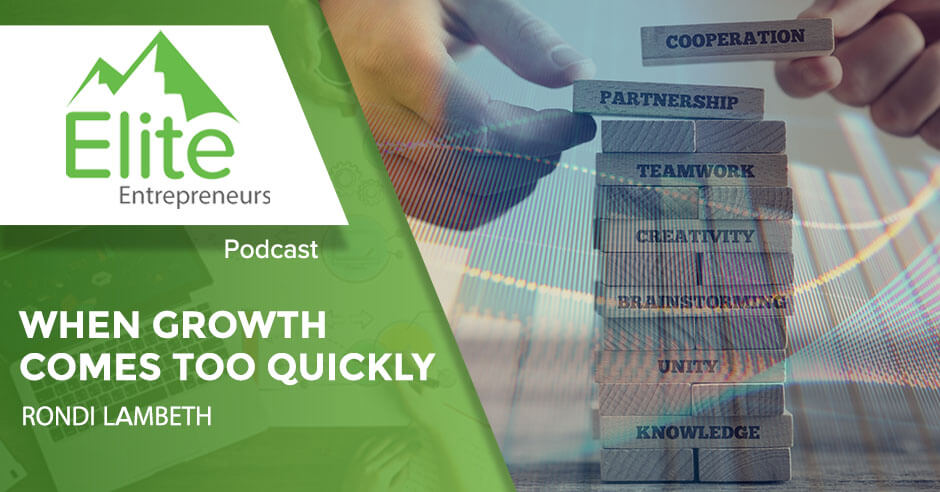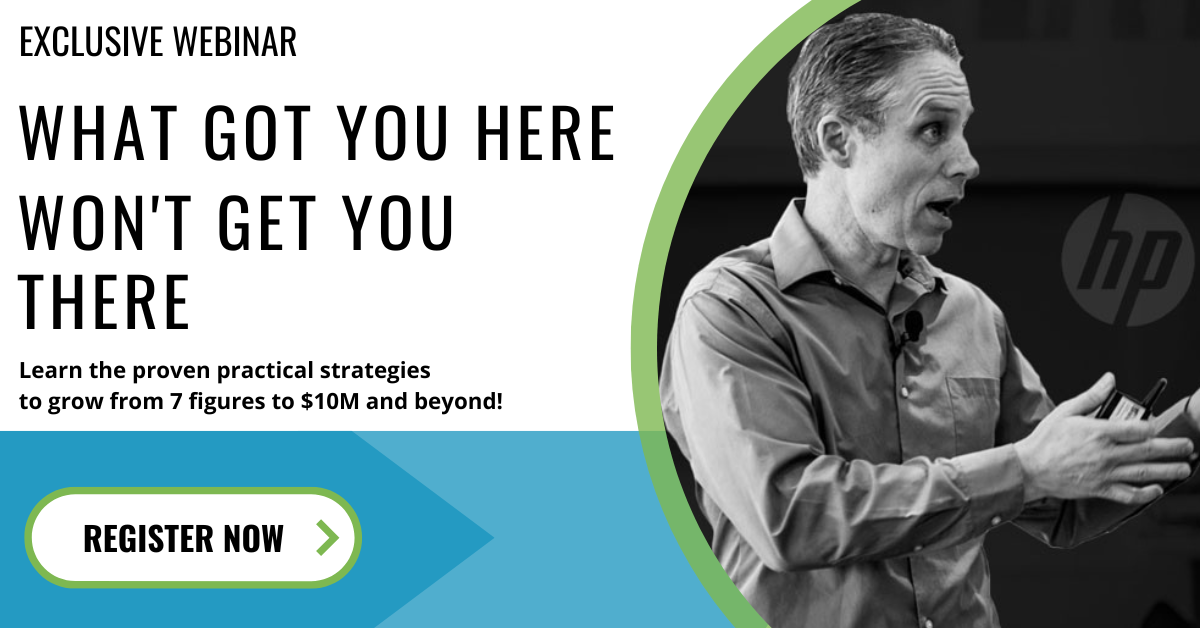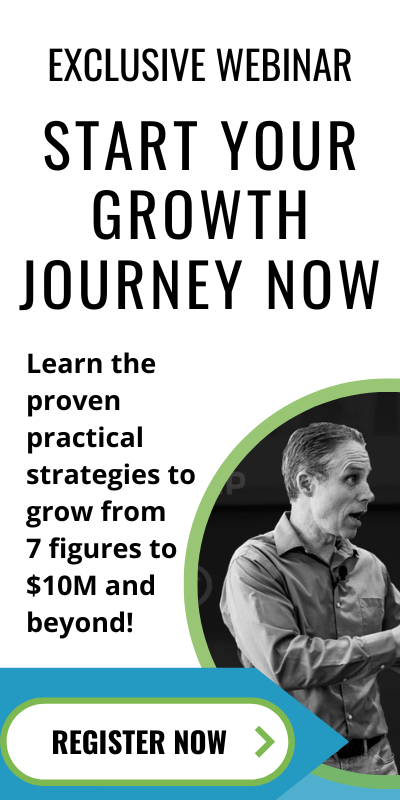Episode 25: When Growth Comes Too Quickly, With Rondi Lambeth
Most of everything in your life today is based on your FICO credit score, but no one teaches or educates how to have a great credit score or, most importantly, how to restore your credit after life has thrown you a few curveballs.
That is where Rondi Lambeth’s company, Fortress Credit Pro, comes in. Rondi educates people on how to have a better life with good credit. He helps people get inaccurate, obsolete, erroneous, and unverifiable items like late payments, collections, repos, short sales, charge-offs, foreclosures, and even bankruptcies permanently and legally remove from credit reports.
Rondi helps people get a 2nd chance.
What the podcast will teach you:
- Rondi discusses his fifteen-year career as a firefighter prior to his work in credit repair, and why Rondi is motivated to help others after his brother’s suicide
- What growth challenges Rondi’s business had after reaching the seven-figure revenue plateau, and what steps Rondi took to overcome those challenges
- Why Rondi recognized the need to build and implement systems to sustain the growth of his business once things started breaking at the $3 million mark
- Why Fortress Credit’s rapid growth created significant growing pains and forced Rondi to learn the value of a company culture
- Why Rondi would prefer to delay hiring and stunt his business growth over hiring the wrong person and having to fix the problem after the fact
- Why solely focusing on growth can be harmful to your business, and why building up and cultivating your leadership team is a necessary step
- Why Rondi believes that building a strong family connection in the workplace has been beneficial to his business
- What strategies Rondi employs at Fortress Credit to build a strong, motivating company culture, and why Rondi believes in cross-training everyone to do each other’s jobs
Resources:
- Website: www.fortresscreditpro.com
- Facebook: www.facebook.com/RondiLambeth
- LinkedIn: www.linkedin.com/in/rondilambeth
- Twitter: @rondilambeth
- Instagram: @rondilambeth
- YouTube: www.youtube.com/channel/UCXFF74-JupsiYop5L0je9hQ
—
When Growth Comes Too Quickly, With Rondi Lambeth
I’m excited to have with me another one of our business owner guests. His name is Rondi Lambeth and he is the Founder, CEO and FICO credit Pro. He is an author, speaker and host of a daily radio show. The show focuses on helping people fix their credit. Rondi has been involved in the credit repair industry for over a decade and is considered one of the foremost experts in the US.
He founded Fortress Credit Pro in 2007. It was the very first company to offer 100% paid on performance credit repair and many of the companies out there have followed suit. He is also a licensed pilot, certified FICO credit professional, distinguished graduate at Front Sight, a retired fireman and most importantly, a father of 3 and grandfather of 1. Welcome, Rondi, to our show.
It’s great to be here.
I appreciate you making the time. Tell me quickly about being a retired fireman. I’m always intrigued when I see people have spent time and in service in some way like that. How long were you a fireman?
I was a firefighter for fifteen years. I retired from Littleton Fire but my first five years were with Sheridan Fire in the suburbs of Denver. I also spent fifteen years as a Crew Chief on a Medevac helicopter with the Army National Guard. I did both of them at the same time. I loved helping people, going out on calls, driving the fire at 100 miles an hour, breaking down doors, smashing windows and all the fun stuff that firefighters get to do.
Thank you again for your service, not only to the Denver area but in the National Guard. I don’t know if you ever speak this way because I haven’t heard you speak yet but I imagine everything you described in terms of fighting fires, breaking down doors, serving and helping people probably transfers pretty well to help them with their credit repair problems. Would you say that’s accurate?
Yes. I got into the credit repair business and stayed there for so long even though most of the time I didn’t make any money as I was a firefighter in Littleton, Colorado and on the busiest rescue in the Denver Metro area where we’d run 18 to 20 calls a day, which was a dozen life or more that we were saving or at least, helping. I thought I was Superman. I was pretty proud of myself and I love my life. My little brother who wanted to be like me become a fireman as well.
To build culture, distinguish what your core values are, portray that in your office, and get your people to go along with it. Click To TweetUnfortunately, I didn’t know he was struggling with his finances. He had medical bills, collections, credit card issues and personal relationship issues. He ultimately took his own life because he couldn’t deal with the financial issues. That hit hard for me. Ultimately, the reason I left the fire department was that I wanted to do something before the 911 call versus after the 911 call. I did some research and found that 5,000 Americans killed themselves every year over credit.
Financial problems are named the number one reason for divorce and stress. Stress is the number one cause of disease and death in the world. I wanted to be at the forefront of stopping that and doing whatever I can to do that. That’s why I started Fortress Credit Pro and we didn’t even use to charge people to do it. We started doing the paid-on results to attempt to get more people to hire us. Being a firefighter and all of that is very important to me.
I only imagined there was a connection. I didn’t know how deep the connection was. What a powerful story, a compelling reason for you to get involved in helping others. It’s an unexpected twist. Thank you for sharing that with us. Let’s talk about how you’ve been able to grow Fortress Credit Pro to have an even greater impact on more people. You started out helping some people not even for pay, created a new model to finance your ability to help more people with a 100% paid on performance and grown the number of people you can serve.
This show is dedicated to learning about the seven-figure growth challenges and what real business owners like you have done to work through those challenges. We’re not going to go back to your early days but when you passed over that million-dollar mark in revenue, was it smooth sailing from there? Are there no problems in growing after that?
In 2008, I was a year in a business. I went to a conference in LA with a guy named Joel Bauer and learned how to do public speaking and sell on stage. He also taught me how to get on TV and radio. I got back. The day after Thanksgiving in 2008, I made two phone calls. I booked myself on a local radio show. It’s supposed to be a 5 to 10-minute interview. It turned out to be three and a half hours. Callers were calling in wanting help with their credit and identity theft. That’s when I realized I have something here. They canceled the Rush Limbaugh reruns because the phones were lit up for three and a half hours.
Not many people can claim that they booted Rush Limbaugh out of a spot.
Yes, in 2008 when he was pretty popular. I was proud of that but then when I got to the office on Monday morning, I was extremely embarrassed because my website crashed and my systems fell apart. Even though I had hundreds of requests, I don’t know if I even helped a dozen because my systems were not set up. From 2008 to 2012, what I focused on was building systems and a business versus working in the business. For me, when I hit $1 million and $2 million, it didn’t make a big difference. Once I hit about $3 million when stuff started breaking.

Business Growth: It’s more costly to hire the wrong person. It just adds more problems to your current company that you hired the person to fix it.
On this show, we talk often about the 1s and 3s of revenue, roughly every time you triple. All that system-building work you did to figure out customer acquisition and customer fulfillment typically happens between $300,000 and $1 million. It enables you to go to $1 million-plus. There’s another thing when you triple from $1 million to $3 million. It sounds like you experienced that at $3 million. Let’s talk about the growing pains for you at $3 million.
My merchant account got shut down so I couldn’t bill anybody for five months. From June 2017 to November 2017, I couldn’t bill any clients. You got to remember that 100% of my clients do not pay their bills on time. When I finally got a merchant account, guess how many people paid me? Not very many. I lost a little over $2 million from that little snafu and that was because my systems broke. Some of the other problems were the growing pains with employees, communication and employee manuals, building a culture, hiring and firing people and getting sued by people that we fired and people that just wanted some free money. There were a lot of growing pains between 2017 and 2020.
Let’s dive in on some of those. In the scope of our time together, we probably can’t address all of them. When you talk about the growing pains around people and culture, I get the systems thing. In your case, that was a big hit to have the systems come apart and your merchant bank shut you off. That’s a nightmare but that’s not necessarily relevant to every single reader.
The other things will be so let’s talk about what it was like to go from $1 million to $3 million, the team size and learning about what it costs to have a wrong hire or any of the cultural impacts around that or how you align team members. What were some of the specific examples that you worked through that would be beneficial to our readers?
I wanted to address the merchant account thing. I learned a valuable lesson from that. Always have at least three open merchant accounts. The reason we lost ours was that we grew so fast. The bank taught me it was a fraud and I’d been with that bank for 22 years. It was my personal bank. I always have at least 3 backups or 2 backups for your merchant accounts.
As far as the hiring, I didn’t know what culture was. I’m just a fireman. I’ve never worked in corporate America. Firefighters have a different culture. I understand what culture is. I had to do a lot of learning to learn how to build culture, distinguish what our core values were, portray that in our office and then get our people to go along with it.
What I’ve learned after this big hiring phase is you don’t have to build culture necessarily and teach people. They learn by example. The other thing I learned with that is before I had the culture and the company that I have with the employees that are on board with the core values and mission of Fortress, I used to have the hire and fire, specifically, the firing part. I didn’t use to like it. Now, I don’t mind it at all and I haven’t fired anybody in a very long time.
It causes hesitation and questioning inside your team when you hire the wrong person. Click To TweetThe reason why is I don’t have to fire anybody. My employees chase them out if they don’t fit into our culture. We’re so much better at hiring people. We won’t hire anybody unless they’re going to fit in. We hire readers and people that are trying to constantly improve themselves. Self-development is important in our company. If they’re not readers, not into personal development and getting better, I won’t hire them. I would rather not hire someone and grow than hire the wrong person.
Let’s underscore the point you’re trying to make there. You have a real need or your business could grow if you hired somebody. Why would you delay hiring instead of grabbing somebody so you could grow?
What I found by hiring the wrong person is it’s more costly than the benefits of hiring someone. Instead of taking 2 steps forward, you’re taking 1 step forward and 2 steps back because you have to fix the problem. It adds more problems to your current company that you hired the person to fix it. I didn’t say that very well but the reason you don’t want to hire is it’s like putting a rotten apple in with a good basket of good apples. It’s not going to end well.
You don’t want the contamination, the ripple effect or the impact on the rest of the team.
What it does is it causes your team to maybe consider, “Are you as good a leader as they thought you were? Are you making the decisions?” It causes a little bit of hesitation and questioning inside your team when you hire the wrong person.
Back to your firefighting days, think about the cost if any one team member were questioning the leader in those moments where you have a fraction of a second to make decisions or you got to communicate. What kind of uncertainty, lack of belief or trust in a leader is it? That’s damaging in that situation. Sometimes we don’t see it as life and death in a business setting but the costs are extremely high.
You learn some things about culture and culture fit when it comes time to hire. I love that you said, “I don’t have to fire anybody anymore.” The culture is so present everywhere that they either recognize it themselves, “I’m not a fit here,” or the rest of the team says, “You’re not a fit here.” You’ve been on the Inc. 5,000 list for a couple of years. You’ve grown the team. The team’s getting up there in size. Talk to me about the need for hiring or developing a leadership team that your company is growing. What’s that process been like for you?

Business Growth: Getting everybody on the same page is extremely important. You don’t just put someone in leadership because you need them. They need to earn that position and be a leader, not just a manager.
One of our biggest struggles is building a leadership team. One of the things that I did early when stuff started breaking was I hired an EOS-certified coach to come in. He spent five days with us in our office interviewing all of the employees. That’s when we come up with our core values. We started doing our Level 10 meetings every week. There are two ways of communication but we add the third person there.
It’s not 3 ways and 6 ways of communicating. You have sixteen different ways where it can be heard and compounds. Getting the leadership team on board and everybody on the same page is extremely important. The thing is you don’t just put someone in leadership because you need them. They need to earn that position and be a leader, not just a manager. That’s a big difference between a leader and a manager.
Until you’re ready to make that transition where you put together that leadership team and set the vision as leaders, we have a clear story that we’re all aligned to. We’re constantly communicating and reinforcing the way you’re describing. Until you get to that point where you’re ready to invest and put together a leadership team, all of that responsibility rests on your shoulders and there’s only so far the company can grow, which I’m sure that you experienced. You got some outside help and got clear on values. You start to put together a real leadership team. How has that enabled you to scale as a business?
Every time you can double yourself, at least for me in my business, it allows me to get outside of the office and the business, get above the business, look five years down the road, go out and do what I like to do, which is TV interviews, speeches and podcasts and grow the business way. Also, let the team grow themselves. I got sick in May of 2018. I started chemo and did twelve months of chemo from May of ‘18 to May of ‘19.
I wasn’t in the office but my company continued to grow by about 20%. In 2019, I got divorced and took six months off to work on myself and the company continues to grow. If it wasn’t for that, the whole business would have fallen apart. It goes back to the E-Myth days of building the systems where it doesn’t need any one person, especially if it doesn’t need me.
If it was reliant on you, that would have been a disaster.
There would be no business because I wasn’t there. In November 2018, I got out of bed for three days. Building the systems and that leadership team is extremely important. Everybody wants to grow, scale and go as fast as they can. You might notice that 90% of businesses fail in that no man’s land of $5 million to $50 million because they’re just trying to grow. They’re focused on growing versus building their systems, the culture and the leadership team. It’s more important to build it inside the team, hire the right people and get the right people in the right seat on the bus versus just scale.
There’s a big difference between a leader and a manager. Click To TweetEverything you’re saying rings true to me. I appreciate your willingness to come and share some of those valuable insights. It underscores more but your company’s ability to make the Inc. 5,000 list while you were going through chemo or changes in your life that are extremely difficult is impressive. The only way that’s possible is that you had done the work to get it off of you. It wasn’t reliant on you.
As Jim Collins talks about, you stopped being a time teller for everybody and built clocks so the company could tell what time it was without you there. Well done. Kudos to you for all you did to make a viable business that wasn’t connected to your horsepower. A lot of entrepreneurs rely on their horsepower to pull it forward. As you well know, something can happen that takes you out of the game for extended periods. If you haven’t done this company-building work, your business could be gone in a matter of a very short period.
Reflect on not just those difficult times of 2018 and 2019 but also think about your full growth journey. We’ve talked about hiring and multiplying you as a leader. No business can outgrow the capacity of its leadership team. Leadership is the ceiling for the company’s growth. You’ve talked about that. What else have you learned about getting people to pull in the same direction or anything around strategy or meeting rhythm? Any of those other things that you’ve learned as you’ve gone from entrepreneur or technician to CEO or leader of leaders?
There’s a lot we’ve learned. I don’t know how to answer your question specifically without giving you some examples of what I do at the company. I travel three weeks a month. I’m only in the office one week a month and it’s generally Monday, Tuesday and Wednesday. Our meetings are 2-minute, 4-minute and 8-minute meetings. I find that most meetings can be done in less than eight minutes.
If someone wants to set a meeting with me, I asked them, “Is it a 2, 4 or 8?” We cut our meetings down to short as possible. Another thing that I do when I come down is that month, we celebrate everybody’s birthday of that month but if there was no birthday, then we go celebrate as a team. It’s 80% of our team will come to every single function every month. We’ve been rollerblading. We did sushi and ice skating. We’re constantly building that.
There are a lot of people that say you shouldn’t become friends with your employees and I don’t necessarily agree with that. You should be friendly, hang out and spend time with your employees and truly build a family connection, a real family that people want to be a part of. All but one, of my employees are Millennials and I found that’s what they want. They want a family they can connect with. They want to go to work and have fun. They’re extremely hard workers.
They want to make a difference in people’s lives. You get them on that same path. Fortress Credit Pro is saving thousands of lives every single month by getting people’s credit and finances fixed which fixes their relationships. It prevents divorce and stress. You get them on that bus and they want to be there every day.

Business Growth: It’s more important to build your systems and culture, hire the right people, and get the right people in the right seat on the bus versus just scale.
That’s powerful, Rondi. I’m in 100% alignment with how you’re leading your employees and what you’re sharing with our readers. When you give people a purpose that they can grab onto that they can be passionate about, it changes the whole dynamic. They’re not going, “It’s Monday.” They’re not running out the door on Friday afternoon. That doesn’t mean they don’t like to have a personal life or a weekend but it means they’re all in on what you’re doing because it’s not just about a transaction. I applaud you for what you’re doing to help your people feel connected to something bigger than just a revenue number or a paycheck. That’s awesome.
There’s another thing that I did right and I’ve thought of two other things. The other thing I did is everybody in my company can do the other person’s job. It’s like in the fire department. The firefighter knows how to turn on the engine. The captain knows how to run the hose. Some people are better at it. One of my employees, Deshaun, who runs the customer service team, celebrates his birthday.
He ended up taking two days off and my employees can take unlimited time off if they want. It doesn’t break anywhere because everybody comes to do his job and pitch in. It puts them all in that part of that team because I’ll know, “I’m taking a day off and you take it off.” There is Corporate America where you got to submit it and you only get 40 hours of PTO time.
How does that look that everybody knows how to do everybody else’s job? How do you enable that to happen? It doesn’t just happen. Do you have some very structured, cross-training types of things or do you do it during onboarding that people rotate around or are the whole structure flexible that anybody can play any position?
For example, if we hire a salesperson or a credit consultant, they’re going to sit with the billing department one day, the customer service department another day and then the processing department. They get trained in those positions. Throughout the month after they have been trained, we will bring them back and put them in that position so they get a refresher every month. Maybe it’s only 2, 3 or 4 hours but they’re getting a refresher with it. Sometimes, the customer service agent will put a headset on and listen to the credit consultants’ call or vice versa but they’re all cross-trained there.
Every week, we do training for the entire company. One week, it might be customer service training. Everybody gets on the training. One week, it might be on how to read a credit report. The billing department doesn’t even know how to read a credit report. Unless the person has questions about their bill, the billing department better knows how to read a credit report because that person’s going to be pissed off if they get transferred around to someone else and have to explain the whole story again. Everybody wants to tell you a story. Every week we train on each other’s jobs.
Are you taking the lead on that? Do you have somebody else taking the lead or does it rotate?
Hang out with your employees and truly build a family connection, a real family that people want to be a part of. Click To TweetIt rotates. I took six months off from work. What was nice with that is watching leaders rise in the company and come forward with their stuff. I always encourage ideas from the employees, even if they’re bad ideas. Most of the good ideas that we get are from the employees. It’s not for me. I just encourage them. I look at myself as the Chief Encouraging Officer, not necessarily the Executive Officer.
I love the idea of the 2, 4 or 8-minute meetings and cross-training. New hires listen in on calls or sit for a day in each of the different areas. All are fabulous ways to connect the dots for people and help people stay aligned and engaged in what we’re doing. There are a lot less wobble and inefficiency in your company than in many other companies where they think they’re being more efficient by not, “wasting or spending a lot of time” on these cross-training activities.
We’ve got company meetings and we are going out to do rollerblading. That’s a lot of investment. That’s not very efficient. Isn’t that a waste of time and money? Everything you’re saying is because of the very intentional investments you’re making in building the team, cross-training the team and connecting dots for people, you are all one team pulling in the same direction. You can go further, faster. It sounds to me.
It’s not all perfect.
It’s never as good on the outside as it looks on the inside but it’s also great what you’re doing. Please tell us, Rondi, for those who are interested in learning more about Fortress Credit Pro or you personally, if you’d like to connect with people via social channels, how can people connect with you and learn more about what you do? Share whatever you like.
Social media is great. I’m very active on social media. Everything is @RondiLambeth, Facebook, Twitter, LinkedIn, Instagram and YouTube. I have RondiLambeth.com. I do quite a bit of free content on how to increase your credit score, pay less in taxes, get out of debt and be a better entrepreneur. Anything @RondiLambeth, they can find me if they need help with any of that stuff. I started America’s first paid-on-results credit report. I want to make a difference. I’ve been to different countries and dozens of states. I see the same reaction everywhere I go.
People are stressed out and I believe it’s because of their finances. I wanted to make a bigger change. We announced at the Driven Event on stage that we are offering free credit repair, no strings attached. You have to have a credit monitoring service but if anybody wants to get free credit repair, they can reach out on any of the social media or the website. They pay for their credit monitoring service and we fix their credit free.
For those of you reading, I highly encourage you because unfortunately, many of you also have your credit challenges being business owners. That’s often the case. Please, reach out. Rondi, you’ve been not only a fantastic but a fascinating guest on our show both personally and professionally. You’ve done some amazing things. I appreciate you sharing some of your wisdom and insight with some of our seven-figure business owners who are trying to grow. Thank you.
It’s been great to have it on here. If there’s anything I can help your readers with, find me. I’m easy to find. Go to Google, type in Rondi and I’ll pop up.
For those of you reading our show, please continue to read. Engage in rating and reviewing. Give us feedback. These are intended to be helpful for you. All of you would agree that the insights Rondi shared with you will be worth lots of sanity in your business and maybe even in your personal life if you need some credit repair help. That’s it for this episode. Keep reading and growing.
Important Links
- Fortress Credit Pro
- E-Myth
- @RondiLambeth – Facebook
- Twitter – Rondi Lambeth
- LinkedIn – Rondi Lambeth
- Instagram – Rondi Lambeth
- YouTube – Rondi Lambeth
- RondiLambeth.com
Want to listen to more? View all episodes here >



